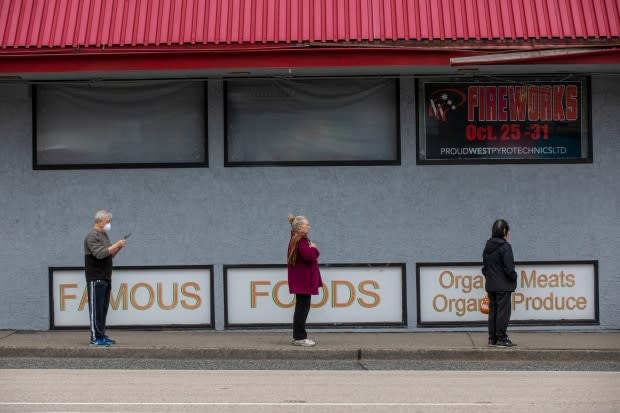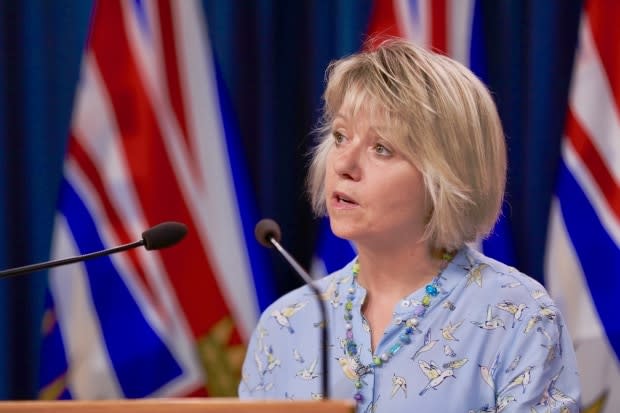What you need to know about COVID-19 in B.C. on March 30, 2020
THE LATEST:
Provincial health officer Dr. Bonnie Henry announced 86 new cases since Saturday.
As of Monday afternoon, there were 970 total cases of COVID-19 in the province.
There have been 2 additional deaths in Vancouver.
106 people are in hospital, including 60 people in intensive care.
Nineteen major hospitals in B.C. have been designated as COVID-19 care sites.
Paid parking has been suspended for patients and staff at B.C. hospitals.
Teachers are back on the job Monday, working on a plan to teach students at home.
There are new rules around grocery shopping in B.C.
The province has announced $3 million in emergency funding to help struggling food banks.
The total number of COVID-19 cases in B.C. has risen to 970 according to provincial health officer Dr. Bonnie Henry.
Since the last provincial update on Saturday, 86 new cases were reported across the province. Two more people have died from the virus in Vancouver. The B.C. Coroners Service also confirmed there has been a first death in the community and not at a health-care facility.
Health authorities also announced that 469 people have now recovered from the illness. However, Henry cautioned against letting up on physical distancing measures.
"We have more people everyday in our intensive care units," she said. "We are not through the storm yet. We have not yet reached our peak."
She added that 19 major hospitals are now designated as COVID-19 primary care sites and are prepared to receive patients.
Health minister Adrian Dix says there are 4,233 empty hospital beds across B.C. and that 200 beds are being made ready at the Vancouver Convention Centre.
Dix also announced that paid parking will be suspended for staff and patients at all health authority sites as of April 1 to support physical distancing.
B.C. teachers back to work
Many teachers across B.C. are back on the job with a level of uncertainty Monday, trying to figure out how to teach students who are at home and switching to online learning.
Teachers will either be working from home or returning to schools in small groups to pick up materials, while parents prepare to turn their homes into classrooms.
The province said parents and students should expect to hear more guidance from schools this week.
In-class learning at B.C. schools was suspended indefinitely by the province on March 17. The majority of students in the province were already at home for March Break at the time and many left school unprepared for a prolonged time away from the classroom.
The province on Friday launched Keep Learning B.C., a new at-home education resource website for parents and caregivers who will likely be helping with their child's education for the remainder of the school year.
At the direction of the public health office, the Ministry of Education said school buildings will stay open with limited staff to support children whose parents are essential front-line workers. Officials are asking parents to avoid showing up at schools with children before contacting principals or administrators.
More details on federal wage subsidy
Prime Minister Justin Trudeau announced new details of a subsidy on wages meant to ease the impact of the COVID-19 pandemic.
He said large businesses, small businesses, non-profits and charities will all be eligible for a 75 per cent subsidy. Employers will have to show their revenues have fallen by at least 30 per cent because of the outbreak and the number of employees does not matter.
For workers, the subsidy is 75 per cent of their salary on the first $58,700 their earn — or up to $847 per week — backdated to March 15.
Asked when the money would be delivered, Trudeau did not provide a date.
"Help will be getting to them soon," he said, speaking outside his Ottawa residence on Monday.
Trudeau asked subsidized companies to rehire workers who might have been laid off over the past two weeks, and ensure that all the money through the program goes directly to employees. He said employers that can pay their employees without federal help should do so, warning businesses that abuse of federal financial aid will have serious consequences.
Trudeau added the Canadian Armed Forces have been preparing to help provinces and territories during the crisis, but to date, no provincial or territorial government has asked for military aid.
Grocery store restrictions
The weekend also brought a number of new rules around grocery shopping in B.C. The province said grocery stores and other food retailers should not allow customers to use their own reusable bags or boxes, according to new guidance from the B.C. Ministry of Health, and offer clean reusable bags instead.
The ministry and the B.C. Centre for Disease Control released several pages of guidance to retailers in an effort to curb the spread of COVID-19.
The advisory clarified that more than 50 people can be in a large grocery store at once, but only if proper physical distancing — staying at least two metres away from anyone outside your household — is possible.

$3M for food banks
The province announced $3 million in emergency funding Sunday to help struggling food banks keep up with the surge in demand due to the COVID-19 crisis.
Food Banks British Columbia will distribute the money to food banks province-wide, so the centres can buy and distribute food, pay employees and cover other costs essential to the delivery of their food programs.
The province also announced a new ministerial order under the Freedom of Information and Protection of Privacy Act (FOIPPA) on Sunday, hoping to help front-line workers use more communications tools in the fight against COVID-19.
The order will help workers share information with individuals using apps, such as Slack, which is typically restricted under FOIPPA rules.
The latest numbers in B.C.
Provincial health officer Dr. Bonnie Henry confirmed 92 new cases of COVID-19 on Saturday, bringing the provincial total to 884 cases. There was no update on Sunday. Henry and Health Minister Adrian Dix are expected to provide their next update at 1:30 p.m. PT today.
Henry also announced one additional death on Saturday. There have now been 17 deaths related to the illness in B.C., primarily linked to long-term care homes.

The health officer said cases are still rising among people who were exposed before physical distancing began. She warned a severe outbreak is still possible if people don't continue to follow advice from health officials, which includes physical distancing and staying home if you are sick.
At least 12 long-term care homes in B.C. have seen a staff member or resident sickened by the virus. The Royal Arch Masonic long-term care home in Vancouver is one of the latest homes to be affected, though Vancouver Coastal Health did not confirm if a new case at the home was a worker or resident.
On a positive note, Henry said 45 per cent of those who are confirmed to have contracted the coronavirus — 396 people — have now recovered.
Important reminders:
Health officials widely agree the most important thing you can do to prevent coronavirus and other illnesses is to wash your hands regularly and avoid touching your face.
The World Health Organization said more than 80 per cent of COVID-19 infections are estimated to be mild.
What's happening elsewhere in Canada
As of 2:30 a.m. PT Monday, there were 6,320 confirmed and presumptive cases of COVID-19 in Canada, including 66 deaths. Not all provinces have been reporting figures on the number of patients who are considered recovered, but those that are list a total of 592 as resolved. There have also been two COVID-19-related deaths of Canadians abroad — one in Japan and one in Brazil.
For a look at what's happening in other provinces and the territories, check the CBC interactive case tracker.
What are the symptoms of COVID-19?
Common symptoms include:
Fever.
Cough.
Tiredness.
But more serious symptoms can develop, including difficulty breathing and pneumonia.
What should I do if I feel sick?
Stay home. Isolate yourself and call your local public health authority. Do not visit an emergency room or urgent care centre to get tested.
What can I do to protect myself?
Wash your hands frequently and thoroughly. Keep them clean.
Keep at least two metres away from people who are sick.
When outside the home, keep two metres away from other people.
Avoid touching your eyes, nose and mouth.
Unless you're already infected, masks won't help you.
More detailed information on the outbreak is available on the federal government's website.
If you have a COVID-19-related story we should pursue that affects British Columbians, please email us at impact@cbc.ca.

